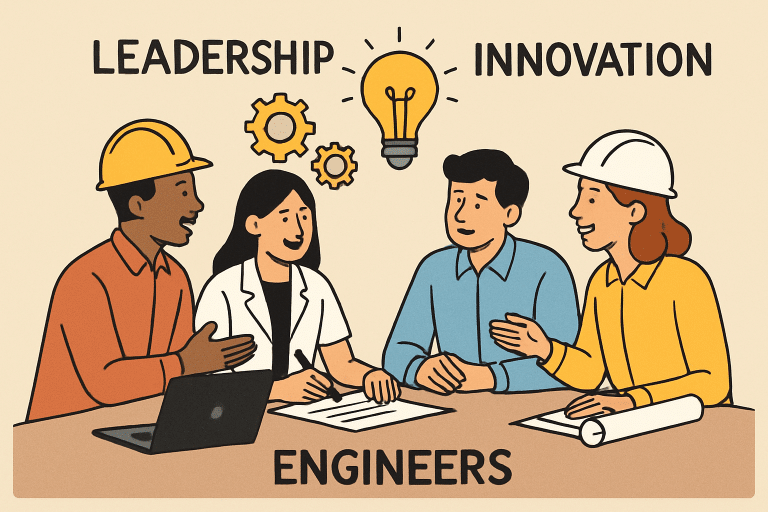Key Takeaways
- Understanding the importance of leadership in engineering.
- Identifying essential leadership skills for engineers.
- Exploring methods to develop and enhance these skills.
- Recognizing the role of emotional intelligence in leadership.
- Leveraging professional organizations for leadership growth.
Table of Contents
- Importance of Leadership in Engineering
- Essential Leadership Skills for Engineers
- Developing Leadership Skills
- Emotional Intelligence in Leadership
- Professional Organizations and Mentorship
- Conclusion
Engineering professionals today face an environment shaped by rapid technological advances and increasing demands for agile, visionary leadership. As engineers transition into roles that require not only technical expertise but also strategic oversight, developing key leadership skills becomes essential. Seasoned experts, such as Mark Henry of Alloy Wealth Management, demonstrate that leadership in technical fields goes beyond pioneering solutions, as it is the art of guiding teams through change, fostering innovation, and achieving organizational objectives. Whether you are aiming to step into a managerial role or striving to become an influential voice within your team, focusing on principles of leadership development can accelerate your growth. Mastering the balance between technical knowledge and people skills enables engineers to influence outcomes, elevate team performance, and adapt to shifting industry trends. Nurturing these abilities is crucial, as the need for engineering leadership is expected to increase over the coming decade, reshaping the landscape of technology-driven industries.
By understanding the specific requirements of effective engineering leadership and by adopting purposeful strategies, today’s professionals can position themselves at the forefront of innovation, problem-solving, and positive workplace culture. As organizations increasingly seek individuals capable of bridging technical depth with a strategic vision, those who invest in their leadership journey will stand out in the evolving marketplace. Integrating essential soft skills, leveraging peer mentoring, and seeking development opportunities through professional bodies are practical ways engineers can become impactful leaders. These actions align with industry-wide shifts highlighted by reputable sources, emphasizing the growing importance of leadership in driving technical and business success.
Importance of Leadership in Engineering
Leadership is a cornerstone of engineering advancement, bridging the gap between highly technical skill sets and broader organizational goals. Effective engineering leaders empower their teams to tackle complex projects, manage ambiguity, and drive efficiency. Their ability to see the bigger picture while guiding technical workstreams is critical to innovation and progress. As industry reports anticipate continued demand for engineering managers through 2033, the significance of leadership will only grow. Leadership in this field is not limited to overseeing tasks; it includes advocating for team growth, championing ethical practices, and navigating the impacts of emerging technologies. As projects become more interdisciplinary and geographically dispersed, leadership ensures that teams remain connected, focused, and motivated, capable of moving from concept to completion with efficiency and vision.
Essential Leadership Skills for Engineers
Engineering leaders are most effective when they possess a combination of core technical and soft skills. While each field may have nuances, the following qualities are universally valued:
- Technical Expertise: In-depth knowledge of engineering fundamentals and the latest advancements positions leaders to make informed decisions and earn their team’s respect.
- Team Management: Building cohesive teams, facilitating collaboration, and aligning personnel to shared goals are fundamental leadership tasks.
- Project Management: Proficiency in managing timelines, resources, and risks ensures projects progress smoothly and objectives are met.
- Communication: Clearly conveying ideas to both technical and non-technical stakeholders is vital for aligning vision and driving action.
- Adaptability: Responding swiftly to industry shifts, technological advancements, and unforeseen challenges enables ongoing relevance and growth.
Developing Leadership Skills
Developing leadership capabilities is an intentional process that every engineer can embark upon. Several effective approaches include:
- Continuous Learning: Pursuing formal and informal education through courses, webinars, and industry conferences keeps skills sharp and expands perspectives.
- Public Speaking: Gaining confidence in communication through organizations like Toastmasters can transform an engineer into a compelling leader who inspires and informs.
- Mentorship: Learning from experienced mentors and guiding junior colleagues solidifies leadership competencies and nurtures a culture of growth.
- Cross-Functional Collaboration: Working across departments broadens understanding and prepares engineers to address challenges that extend beyond their technical domain.
Emotional Intelligence in Leadership
Emotional intelligence (EI) distinguishes exceptional engineering leaders by their ability to empathize, communicate, and resolve conflicts. High EI leads to increased trust, better relationships, and more resilient teams. Leadership grounded in self-awareness, empathy, and effective stress management is proven to boost retention rates and productivity. According to scientific studies, EI is closely linked with organizational performance and leader effectiveness.
Professional Organizations and Mentorship
Professional associations such as the National Society of Professional Engineers (NSPE) play an instrumental role in developing tomorrow’s engineering leaders. These bodies offer networking events, skill-building workshops, and leadership programs designed to meet evolving industry needs. Participating actively in such organizations also exposes engineers to broader perspectives and best practices, helping them become more versatile and influential in their careers. Peer mentorship circles foster a two-way learning process, allowing both mentors and mentees to grow together.
Conclusion
Leadership development should be a purposeful pursuit for every engineer aiming for a lasting and impactful career. By integrating technical expertise, emotional intelligence, continuous development, and the support of professional networks, engineers can adapt to industry change, lead with confidence, and inspire the teams and organizations they serve. Investing in these leadership capacities not only boosts individual career trajectories but also strengthens the future of engineering as a whole.
